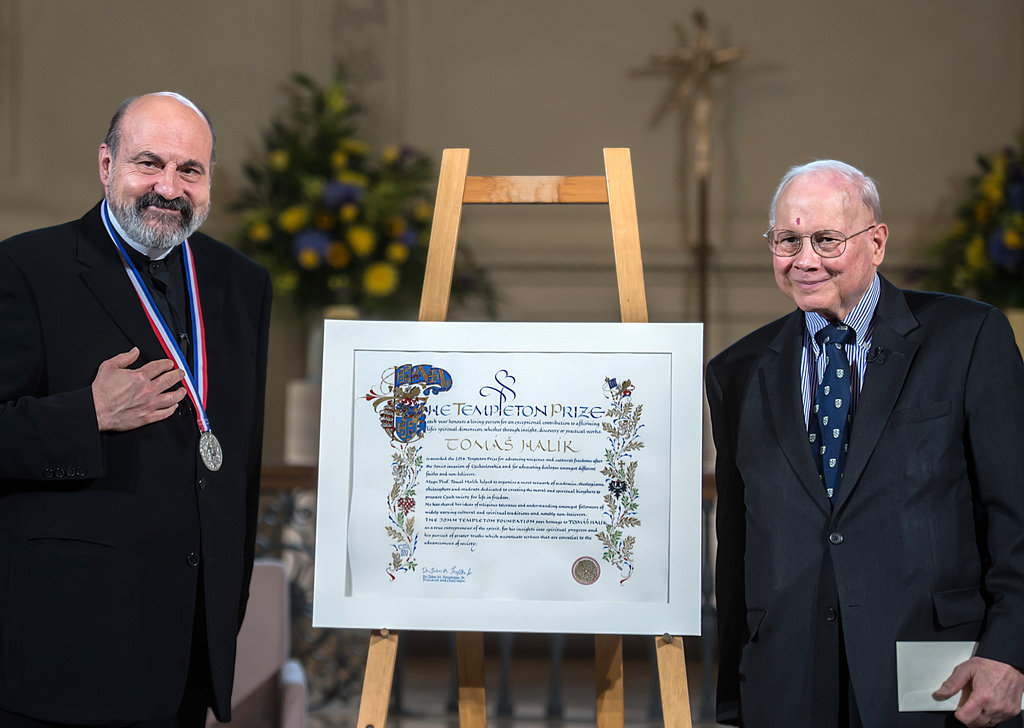The Czech priest and philosopher Tomas Halik, who advanced religious and cultural freedoms after the Soviet invasion of his country, has received the 2014 Templeton Prize.
Valued at £1.1 million (about .8 million or €1.3 million), the Templeton Prize is one of the world's largest annual awards given to an individual and honours a living person who has made exceptional contributions to affirming life’s spiritual dimension.
Condemned by his nation’s communist government as an ‘enemy of the regime’ in 1972, Mgr Halík, 65, spent nearly two decades organising and building an extensive secret network of academics, theologians, philosophers and students dedicated to cultivating the intellectual and spiritual underpinnings for the democratic state he and others envisioned.
Those years of groundwork and counselling to liberation leaders such as Vaclav Havel and Cardinal Frantisek Tomasek helped Czechoslovakia transition to democracy following the ‘Velvet Revolution’ of 1989.
Since that time, Mgr Halik has advocated religious tolerance and understanding through his writings and lectures by sharing ideas and beliefs among followers of widely varying cultural and spiritual traditions and, notably, non-believers.
In a speech at the ceremony, Mgr Halik spoke about the changing understanding of religion, specifically Christianity, over the past decades in Europe and the implication for society and individual freedom. He also asked: ‘How can religion – and specifically Christianity – transform the globalisation process into a culture of communication? How can the power of faith create respect, where differences are not perceived as threats but as potential for mutual enrichment?
‘Let us not ask whose voice will be stronger in Europe tomorrow, but instead whose will contribute more to a culture of coexistence based on mutual respect and understanding.
‘Christianity’s central message is that God is love and that the triune God is itself a community of sharing. Belief in a God who is love and community of sharing is not a scientific hypothesis but a moral commitment with obvious cultural and political implications. It is a commitment to accept the plurality of our world and to strive constantly to transform it into a culture of communication, sharing and mutual enrichment.
‘Christianity does not need to be a flag flying over Europe, but Europe and the world needs people who restore to the word love the profound meaning that it had in the radical message of the Gospel.’
Mgr Halik commended the model set by Christ, ‘Two thousand years ago the rabbi from Nazareth was asked: Who is my neighbour? That question has lost none of its urgency in the meantime. Jesus turned the question round in an astonishing way. Don’t ask who is your neighbour, become a neighbour yourself! Be close to others, particularly those who need help and love. Offer freedom to those who languish in the prison of their own hatred and guilt by showing forgiveness and a readiness for reconciliation.
‘Jesus’ call for unconditional love, love even for one’s enemies, seems absurd chiefly to those who regard love as a sentiment, as an emotion. But love is something greater than that. It is a space of security in our hearts and lives that we offer to others to let them truhly be themselves. Only in a space of love and acceptance can we discover the truth about ourselves, can we develop the best that is within us. But love is always a bold and risky step. Whoever loves risks being disappointed and wounded.
‘Our world is full of wounds. It is my conviction that those who close their eyes to the wounds in our world have no right to say: My Lord and my God. A religion that ignores people’s misfortune and suffering is an opium of the people. A God that does not bear wounds is a dead God. When someone offers me their God, I ask: Is it the God of love, wounded by our world’s suffering? I am not willing to believe in any other god.’
Leading members of the Czech and UK Catholic community, Czech political and cultural leaders, along with other senior British faith leaders, among them Bishop John Sherrington, Auxiliary Bishop of Westminter, attended the ceremony.
Reflecting on Mgr Halik’s words, Bp Sherrington said ‘I am delighted to witness Mgr Halik’s award of the Templeton Prize which affirms his dedicated work and commitment to dialogue between people of faith, between faiths and of no faith. The building of a culture of encounter and dialogue is very important within our societies and between nations at this time in history so that the dignity and equality of each person is respected.
‘Mgr Halik reflected on the story of the apostle Thomas and said that Thomas met God through the wounds of christ. We are invited to be close to the wounds of our neighbours and society and there meet Christ.’
Mgr Halik is the 44th recipient of the Prize, established in 1972 by the late global investor and philanthropist Sir John Templeton. Former laureates include Rev.Billy Graham (1982), Aleksandr Solzhenitsyn (1983) and Martin Rees (2011). Last year’s recipient, Desmond Tutu, followed the 2012 Templeton Laureate, the Dalai Lama.




